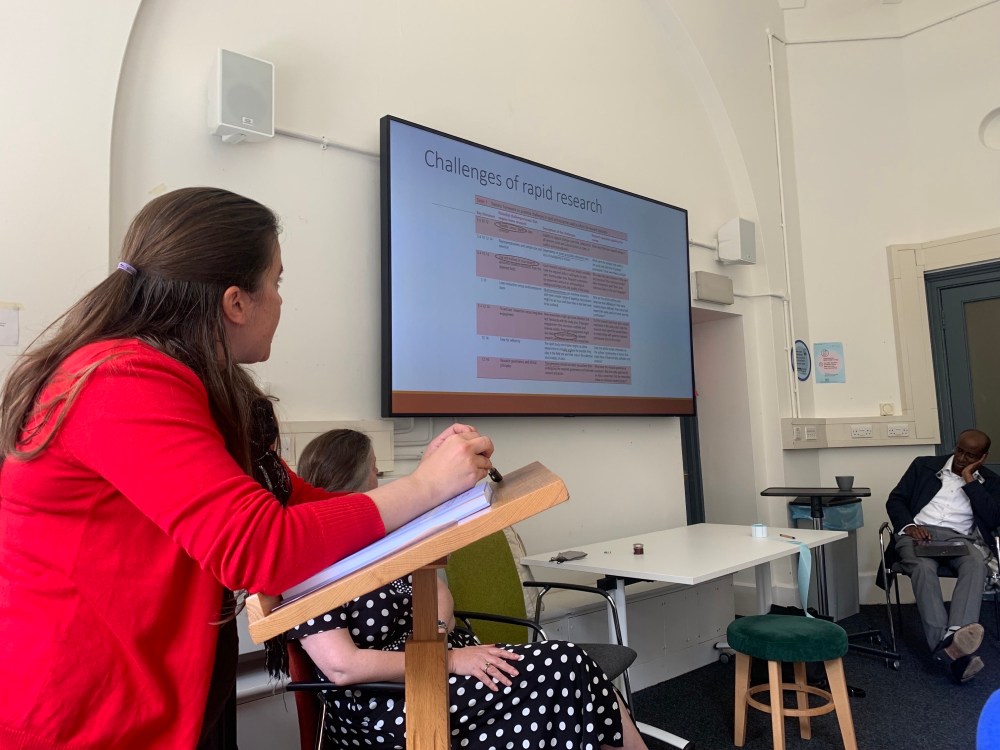REBECCA IRONS
Social Science and Humanities research with and on the NHS has never been more urgent than in a post-pandemic context. However, interdisciplinary collaboration with health services presents particular issues ranging from practicalities of access to expectations and differing disciplinary approaches between the clinical and the social/humanities.
Being a long-time Latin Americanist myself, I had only began working with the NHS during the start of the COVID-19 pandemic; quite the time to begin one’s relationship with our health system! Granted that this was a particularly trying time to become involved with ethnography of the NHS, and yet, my baptism of fire didn’t deter me from nurturing the growing interest in decision making at the senior levels of health care. This research agenda later developed into another NHS Ethnography whilst on secondment at the Nuffield Trust in 2021-2022. From these research experiences, it quickly became clear that the process would not necessarily be straightforward when it came to the NHS. In the case of my work, long delays were caused due to my (admitted inability) to deftly navigate the NHS Ethics approval system. Having completed my PhD in Medical Anthropology at UCL, I had already heard many stories from my colleagues regarding their own challenges in conducting ethnography in the NHS as well.
However, as an anthropologist I’m acutely aware that kin and community are the bedrock for support and development and so, in collaboration with Nuffield Trust Senior Fellow Stephanie Kumpunen, we decided to bring together other early career researchers in a similar predicament in order to collectively share and tackle the challenges of undertaking ethnography in the NHS.
Over one day in May 2022, we sought to support and promote timely, interdisciplinary research that uses social sciences and humanities to respond to the important questions in health services, and to develop and strengthen the support network amongst ourselves.

During the event, interdisciplinary expert panellists Dr Cecilia Vindrola-Padros (UCL, RREAL), Helen Buckingham (Nuffield Trust), and Ron Agble (Royal Free Hospital) shared practical advice on overcoming challenges for early career researchers (ECRs), such as how to work on provider and policy timelines using ‘rapid ethnographic’ approaches, how to map out and collaborate with the various organisations involved in the provider and policy landscape, and finally how to apply practical approaches to widening inclusion in ethnographic research in the NHS.

Our keynote on the ‘Dangers and Delights of Ethnography in the NHS’ was given by Dr Gemma Hughes (University of Oxford), wrapping up a wholly successful day of deep reflection and collaboration between early career ethnographers with a shared interest in the NHS.

After this fruitful day of engaged reflection and discussion, a number of NHS Ethnographers were keen to share their work and ideas with others who may also be in a similar position. As such, I present to you the ‘Early Career Ethnographers of the NHS’ Blog series.
Over the next six weeks, we will publish new work from interdisciplinary scholars investigating and analysing the realities of ethnography with the NHS, incorporating a range of methodological pieces and case studies.
Our first article by Stephanie Kumpunen will cast an investigative eye into rapid ethnography, exploring the methodological framing and 5 different case studies, in order to help readers consider whether or not the rapid ethnographic method would be the best option for them and their project needs.
A second methodological piece comes from Esca van Blarikom, as she explores the use of participatory photography amongst patients managing multiple health conditions. Esca’s blog will illuminate the ways in which visual methods can be utilised to understand how patients may find meaning within their struggles.
A delicious alliteration will follow with Dr Jessica Rees’s piece ‘Reflecting on reflexivity’, where she critically considers the way in which her own background reflected upon data collection; an important task for al early career ethnographers to undertake.
Readers will then be reminded of the importance of reciprocity in Dr Sally-Anne Francis & Dr Sarah Yardley’s piece on ethnography in palliative care across services. Writing from her role as a doctor and researcher within the NHS, Sarah will then develop an insightful discussion on issues surrounding access and inclusion when one is researching at their work (or ‘anthropology at home’).
Dr Gemma Hughes will close our series with her exploration of the ‘Delights and dangers of ethnography in the NHS’, advocating for the importance of the ethnographic approach within health services, whilst also doing so with care.
We hope that you will enjoy the series, and benefit from the author’s explorations of numerous different facets of undertaking ethnography in the NHS. Please feel free to get in touch with individual authors if you wish to discuss anything within their articles further.